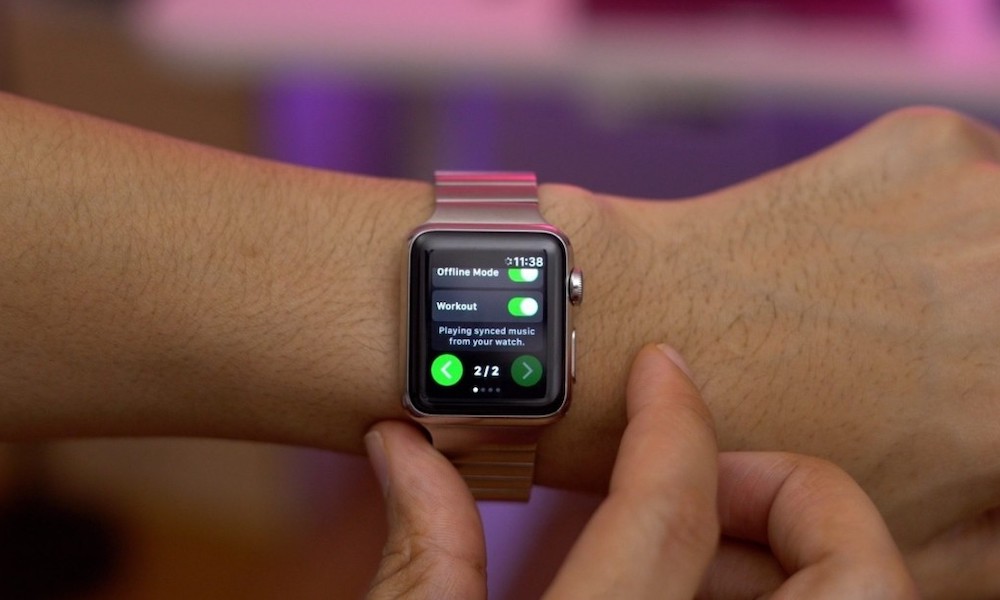Here’s Why Spotify Has Been Limited on the Apple Watch (But watchOS 7 Will Change That)
 Credit: Wearable
Credit: Wearable
Toggle Dark Mode
Despite Apple opening up watchOS to third-party music services a couple of years ago, there’s actually been a surprising dearth of them available natively on the Apple Watch, other than Apple’s own Apple Music service, of course.
This has led to complaints from some quarters that Apple hasn’t been playing fair, most notably from Spotify, which has long been accusing Apple of stifling it by demanding a large cut of subscription revenue and hampering its ability to produce apps that can take the same advantage of Siri, the HomePod, and the Apple Watch that Apple’s own first-party Music app can.
While it seems like an odd statement on the surface, especially where the Apple Watch is concerned, it turns out that there actually has been something going on under the hood that has been holding Spotify back from releasing a fully-functional watchOS app.
Spotify released an Apple Watch app in late 2018, however it was extremely limited, basically working as little more than a remote control for Spotify on the iPhone.
While Spotify has pointed the finger at Apple for its delays, some of that has been on Spotify itself. For instance, although Apple didn’t open up Siri to third-party developers until iOS 13 last year, Spotify didn’t add Siri support until very recently, even though many other streaming services like Pandora were able to embrace it much more quickly.
Offline Music Playback
Apple may be at least partially to blame, however, for one of the biggest limitations in Spotify’s Apple Watch app, which is the lack of direct music playback support on the wearable device. Even though Apple opened up support for offline playback in watchOS 5, and many apps rushed to support it, the capability remained conspicuously missing in Spotify’s app.
In fact, the third-party app that Spotify acquired to build its own Apple Watch app actually did support offline playback, but Spotify mysteriously chose to remove this capability in its own app, along with direct streaming to Apple Watch, despite many other streaming music services and podcast apps offering both of these capabilities.
It turns out, however, that there may have been a reason why Spotify chose to do so, or more likely was even forced to do so by the music industry: the Apple Watch doesn’t support FairPlay DRM to offer native copy protection for music streaming services — at least not in a way that’s accessible to third-party developers.
Digital Rights Management
Since Apple has offered Apple Music natively on the Apple Watch since it released the Series 3 version with cellular support back in 2017, we’re left to assume that FairPlay DRM was always available for Apple’s own use, but that like many of its other features, it hadn’t opened it up to third-party developers.
This could easily be part of what Spotify and other competitors to Apple Music have been complaining about, but they’ve been oddly silent about the specifics, to the point where it’s only this week, now that Apple has announced in a WWDC session that FairPlay is coming to watchOS 7, that most people realized that it wasn’t already there.
FairPlay has been around since the early days of the iTunes Store back in 2003, as it was originally the format used to copy protect every music track sold on the iTunes Store. While Apple famously moved away from it for music during the 2007-2009 era, it still remains in place for purchased movies, TV shows, and even apps. It’s also naturally used for Apple Music tracks, since these are only available to users while they subscribe to the service, so Apple — and the music labels — need to make sure that users aren’t going to be able to download millions of music tracks that they can keep after they cancel their subscription.
Spotify, of course, is in the same boat, and must use DRM within its apps for the exact same reason. FairPlay has long been supported on iOS, macOS, and tvOS, but it turns out that it’s been missing on the Apple Watch. This means that in order to provide offline playback or even direct streaming of Spotify tracks, they’d have to be sent to the Apple Watch without any encryption or copy protection on them, creating a loophole by which Spotify subscribers could potentially make copies of tracks to keep in their own collection even after their subscription ends.
Although this isn’t something that would be easy for the average user to do, it’s a risk that Spotify understandably can’t afford to take, since its contracts with the music industry likely require that everything streamed from the service use DRM copy protection.
Spotify likely doesn’t even have a choice in this, and frankly neither does Apple, so it’s understandable how Spotify would be peeved that Apple Music was able to play nicely on the Apple Watch by taking advantage of a copy protection feature that hasn’t been made available to third-party apps.
That said, as Apple faces sweeping antitrust investigationsin the European Union and in the U.S., its clearly making moves to proactively avoid some of these claims by opening up its services, and the addition of support for FairPlay DRM to watchOS 7 is undoubtedly the next step in what has been a continuing saga of giving third-party developers the same level of access to Apple’s hardware and software ecosystem that Apple itself enjoys.






